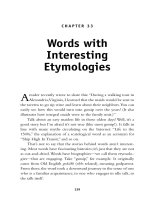Words with Interesting Etymologies
Bạn đang xem bản rút gọn của tài liệu. Xem và tải ngay bản đầy đủ của tài liệu tại đây (136.08 KB, 17 trang )
A
reader recently wrote to share this:“During a walking tour in
Alexandria,Virginia, I learned that the maids would be sent to
the taverns to go sip wine and learn about their neighbors.You can
easily see how this would turn into gossip over the years! (It also
illustrates how integral maids were to the family unit.)”
Talk about an easy maiden life in those olden days! Well, it’s a
good story but I’m afraid it’s not true (like most gossip!). It falls in
line with many myths circulating on the Internet: “Life in the
1500s,” the explanation of a scatological word as an acronym for
“Ship High In Transit,” and so on.
That’s not to say that the stories behind words aren’t interest-
ing. Most words have fascinating histories; it’s just that they are not
as cut-and-dried. Words have biographies—we call them etymolo-
gies—that are engaging. Take “gossip,” for example. It originally
came from Old English godsibb (sibb:related), meaning godparent.
From there, the word took a downward journey to the sense of one
who is a familiar acquaintance, to one who engages in idle talk, to
the talk itself.
139
CHAPTER 33
Words with
Interesting
Etymologies
cmp04.qxd 7/21/05 12:27 PM Page 139
In this chapter we”ll look at a few terms with etymologies that
make for entertaining reading.
erudite (ER-yoo-dyt)
adjective Learned.
From Middle English erudit,from Latin eruditus,from erudire (to
instruct), from e- (ex-) + rudis (rude, untrained).
A branch laden with fruit is closer to Earth than one without.
The same is true for people: the more learning one has, the more
humble one usually is. And it shows in the etymology of this word.
If you’re erudite, literally, you’ve had rudeness taken out of you.
Other words that share the same Latin root are rude and rudiment.
● “Over the decades [Roy Porter] spent at the Wellcome Insti-
tute, part of University College, London, he became legendary
for his industriousness and for the generous, erudite and inspir-
ing leadership that he provided to students, postdoctoral fellows
and visiting scholars.”
—Independent (London)
sobriquet (SOH-bri-kay), also soubriquet
noun A fancy nickname or a humorous name.
From French sobriquet,from soubriquet (chuck under the chin). Prob-
ably from the fact that calling someone by a nickname affords one the
opportunity to cozy up to that person and tap him under the chin.
● “It was this no-nonsense approach that eventually gained
[Pearnel Charles] the sobriquet ‘Hurricane Charlie’.”
—Jamaica Observer (Kingston)
indite (in-DYT)
verb tr. To write or compose.
From Middle English enditen,from Old French enditer,from Vulgar
140
ANOTHER WORD A DAY
During times of universal deceit, telling the truth
becomes a revolutionary act.
—
G
EORGE
O
RWELL
, author (1903 –1950)
cmp04.qxd 7/21/05 12:27 PM Page 140
Latin indictare (to compose), from Latin indicere (to proclaim), from
in- + dicere (to say).
Google the term “was indited” and hundreds of citations show
up where the writer clearly meant to use the word “indict.”While
that usage is incorrect, those writers are not too far off the mark,
etymologically speaking. When someone is indicted, he literally has
charges written against him. The word “indict” is simply a spelling
variant of “indite” that acquired a distinct sense over time. Other
words that derive from the same Latin root, dicere (to say), are: dic-
tionary, dictum, ditto, ditty, benediction, contradict, valediction, predict, and
verdict, and their many cousins.
● “The things he writes or I indite, we praise—
For poets, after all, are lonely men.”
—Alfred Kreymborg, The Lost Sail: A Cape Cod Diary
pentimento (pen-tuh-MEN-toh), plural pentimenti
noun A painting or drawing that has been painted over and shows
through.
From Italian pentimento (repentance), from pentire (to repent), from
Latin paenitere (to regret).
This word comes to us from Italian and literally means repen-
tance. What in the world could a form of painting have to do with
contrition? To know the answer, we may have to apply the penti-
mento approach itself. Digging a bit deeper, we discover the word
ultimately derives from Latin paenitere (to repent or regret). Now it
becomes easy to see. The painting didn’t turn out as you expected
it? Don’t regret the loss of canvas, just paint over it! In other words,
to repent, you repaint. “Palimpsest” is the literary equivalent of the
W ORDS WITH INTERESTING ETYMOLOGIES
141
I have always wished that my computer would be
as easy to use as my telephone. My wish has come true.
I no longer know how to use my telephone.
—
B
J ARNE
S
TROUSTRUP
, computer science professor, and
designer of C++ programming language (1950 –)
cmp04.qxd 7/21/05 12:27 PM Page 141
word pentimento:a manuscript that has been partially erased and
written over. Both terms can be used metaphorically.
●
“Not satisfied with the passive position of the feet in Giotto’s
left-hand figure—which he at first copied exactly, as can be seen
in the drawing—Michelangelo made a pentimento to replace
the left foot, thus giving more stability and energy to the pose.”
—Charles De Tolnay, Michelangelo
cockamamie (KOK-uh-may-mee), also cockamamy
adjective Ridiculous; nonsensical.
The origin of the term cockamamie is not confirmed. It’s believed
that it’s a corruption of decalcomania, the process of transferring a
design from a specially prepared paper to another surface. In the
beginning, a cockamamie was a fake tattoo, moistened with water
and applied to the wrist. How it took the sense of something
pointless is uncertain. It’s perhaps been influenced by such terms as
cock-and-bull or poppycock.
● “It is a family whose financial affairs are sufficiently cocka-
mamie and complex that Rube Goldberg could have been
their accountant.”
—To r onto Star
142
ANOTHER WORD A DAY
There lives more faith in honest doubt, /
Believe me, than in half the creeds.
—
A
LFRED
,L
ORD
T
ENNYSON
,poet (1809–1892)
The Thinner
There is an old joke my mother used to tell about the cheap-
skate painter who watered down the whitewash when he
painted the church in town. A big thunderstorm brewed up
and the rain washed the paint off. The painter cowered and
trembled, then the skies opened and the voice of God
boomed out,“Repaint and thin no more!”
—Martha Grant, Presque Isle, Maine
cmp04.qxd 7/21/05 12:27 PM Page 142
I
hate mankind, for I think myself one of the best of them, and I
know how bad I am.” These candid words of Samuel Johnson,
lexicographer extraordinaire, provide a perceptive observation of
the human condition. A language is a mirror of its people. As a dis-
interested record of the language, a dictionary serves as an accurate
window to the culture. It’s not surprising that there are more words
to describe people who fall on the wrong side than on the other.
Here we look at five such words.
scrofulous (SKROF-yuh-luhs)
adjective 1. Of, pertaining to, or affected with scrofula. 2. Morally
corrupt.
From scrofula, a tuberculosis of the lymph glands, especially of the
neck. The word scrofula derives from Late Latin scrofulae, plural of
scrofula, diminutive of Latin scrofa (breeding sow), perhaps from the
belief that breeding sows were subject to the disease. In olden times
it was believed that a royal touch would cure the disease, which was
also known as “king’s evil.”
143
CHAPTER 34
Words to Describe
People II
cmp04.qxd 7/21/05 12:27 PM Page 143
● “This crushing realization comes by way of a splendid roster of
minor English characters, created by Mount for our amusement
and Gus’s torment. The scrofulous, self-pitying travel agent and
racing-car enthusiast . . . ”
—The Atlantic Monthly
ugsome (UG-suhm)
adjective Dreadful, loathsome.
From Middle English, from uggen,from Old Norse ugga (to fear). As
in many typical families in which one child becomes well-known
144
ANOTHER WORD A DAY
Of course, it’s possible to love a human being—
if you don’t know them too well.
—
C
HARLES
B
UKOWSKI
, author (1920 –1994)
Scrofulous of the First Kind
Dr. Johnson suffered from scrofula, and was, James Boswell
tells us, “carried . . . to London, where he was actually
touched by Queen Anne,” which was supposed to cure the
disease. It didn’t.
—Harold Adler, Nazareth Illit, Israel
Brushing under the Collar
As a medical student, I learned the following about scrofula
and its etymology from a highly respected clinical teacher:
Scrofula is a tuberculous infection of the lymph nodes around
the neck. As a result of the condition, the nodes swell visibly
under the skin of the neck and may drain to the outside. The
string of festering lumps about the neck reminded one of a
brood sow, lying down with teats exposed and leaking to feed
her piglets. Reportedly, the high and extended collars of the
Middle Ages were designed at least in part to hide the sores.
—Stephen A. McCurdy, M.D., M.P.H., Davis, California
cmp04.qxd 7/21/05 12:27 PM Page 144









